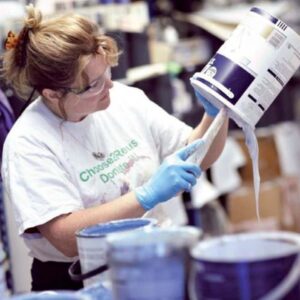Match Trading Case Study
REMO

- What does it do? REMO is a social enterprise and charity dedicated to promoting sustainability by rescuing, reusing, repairing, refurbishing, and recycling materials. With almost 20 years of experience, they have diverted significant amounts of paint, furniture, food, and creative materials from landfills. Starting in 2005, REMO has grown to have two locations in Cambridgeshire, an online shop, and various people and planet-positive initiatives, contributing to the circular economy and reducing waste.
- Turnover:
- Income before first SSE programme: under £100k
- Increase in traded income after 1stprogramme (Lloyds Trade up in 2017): 4% 125K to £130K
- After CBTU in 2019: From £130k – £151k (24% increase)
- Increase in traded income after 3rd programme (Lloyds Scale Up in 2021): Turnover increased from £154k – £208k
- SSE programmes attended: Lloyds Trade Up 2017, CBTU 2019, Lloyds Scale up 2021 London.
Transformative Growth through Match Trading
REMO, formerly known as the Cambridge Community Reuse and Recycling Network, has evolved over its nearly 20-year history into a dynamic social enterprise with a broad mission. Initially founded as an environmental organisation, REMO’s work expanded to focus on promoting the circular economy. Facing funding challenges in the ever-changing landscape of social enterprises, REMO strategically pivoted to create a sustainable trading income, eventually becoming a hub for paint-related services.
Their unique approach stemmed from identifying a gap in their local area related to paint recycling. Recognising the difficulty and the environmental impact of dealing with paint waste, REMO chose to specialize in paint recycling and redistribution. The organisation quickly became a central player in the circular economy, engaging with community organisations, trade customers, and individual households.
Mission and Impact
REMO’s mission is not only to address environmental concerns but also to support the community. Initially, the plan was to distribute recycled paint to community organisations. However, with increasing demand, REMO expanded its membership scheme to include householders and trade customers. Over the years, they have maintained a membership of around 4,000, serving 250-300 community organisations across the UK.
Through their innovative initiatives like remanufacturing paint and extending their services to include furniture, appliances, art materials, food schemes, and workwear debranding programmes, REMO has significantly broadened its impact. Their work goes beyond providing affordable products; it supports employment training programmes, takes on apprentices, and contributes to social development.
Impact on Agency and Confidence
Nikki DiGiovanni, a key figure in REMO’s leadership, believes Match Trading has significantly influenced the organisation’s growth. Prior to the first Trade Up programme attended, REMO’s total income was weighted towards trading but they struggled to grow this source.
Match Trading became a catalyst for transformative change. “Not only did the programme help us to learn how to increase traded income and how to respond to that in an agile way, it also gave us the confidence to strategically invest in the development of the organisation via social investment and larger pots of capital based finance.” Says Nikki. As a result, REMO experienced not just incremental growth but a substantial increase in turnover, from £125K in 2017 to £263K in 2022.
The increased confidence and strategic focus towards growth and sustainability also led to improvements in internal operations. “I work on the business, not in it anymore. So my role is almost entirely strategic now.” Says Nikki. The organisation became more inclusive, involving the whole team in decision-making processes. The learning programme acted as a diagnostic tool, helping to identify systemic issues, and despite challenges, REMO successfully resolved them, creating a more cohesive and interactive work environment.
Growth and Contributions to Impact
REMO’s growth as a result of receiving Match Trading funding was not confined to financial metrics alone; it resulted in a broader impact on the community and business development. The organisation diversified its services, taking on contracts with the local authority to deliver crisis support. This innovative trading approach helped fund their initiatives and build a sustainable model that benefits both the organisation and the community.
As part of their expansion, REMO secured social investment from Access, showcasing a shift towards a more hybrid funding model that combines trading income with strategic grants. The organisation strategically utilised Match Trading to navigate opportunities and challenges, allowing them to evolve beyond a paint-focused enterprise into a multifaceted hub for social and environmental initiatives.
Future Plans and Business Development
Looking ahead, REMO envisions further expansion and influence within the social enterprise space. Their recent acquisition, funded by social investment from Access, and support from Groundwork together with grant funding from the Cambridgeshire and Peterborough Combined Authority supported by Social Enterprise East of England, demonstrates a dynamic shift towards more strategic partnership working to leverage sustained growth through the development of a commercial building. Moreover, they plan to create an eco-hub, offering space and support for other social enterprises that align with their values, further contributing to the social economy.
REMO’s unique approach is akin to a “doughnut economics” model, positioning themselves as a nucleus with concentric rings of influence and engagement which encompasses beneficiaries, volunteers, staff, customers, funders and statutory stakeholders. This holistic approach considers the interconnectedness of their impact, ensuring that their growth not only benefits the organisation but also fosters positive and lasting change within the community and beyond.
Growth factors
REMO’s journey shows the transformative power of Match Trading. Nikki says: “With Match Trading, if we thought there’s an opportunity here but we’re going to need some help to unpick what that opportunity is, then we had the funding in place to be able to make that difference.” From overcoming financial challenges to building confidence and strategically navigating opportunities, REMO has emerged as a robust social enterprise with a profound impact on both the environment and the community. As they continue to grow and innovate, their model serves as a blueprint for sustainable business development and social impact within the circular economy framework.